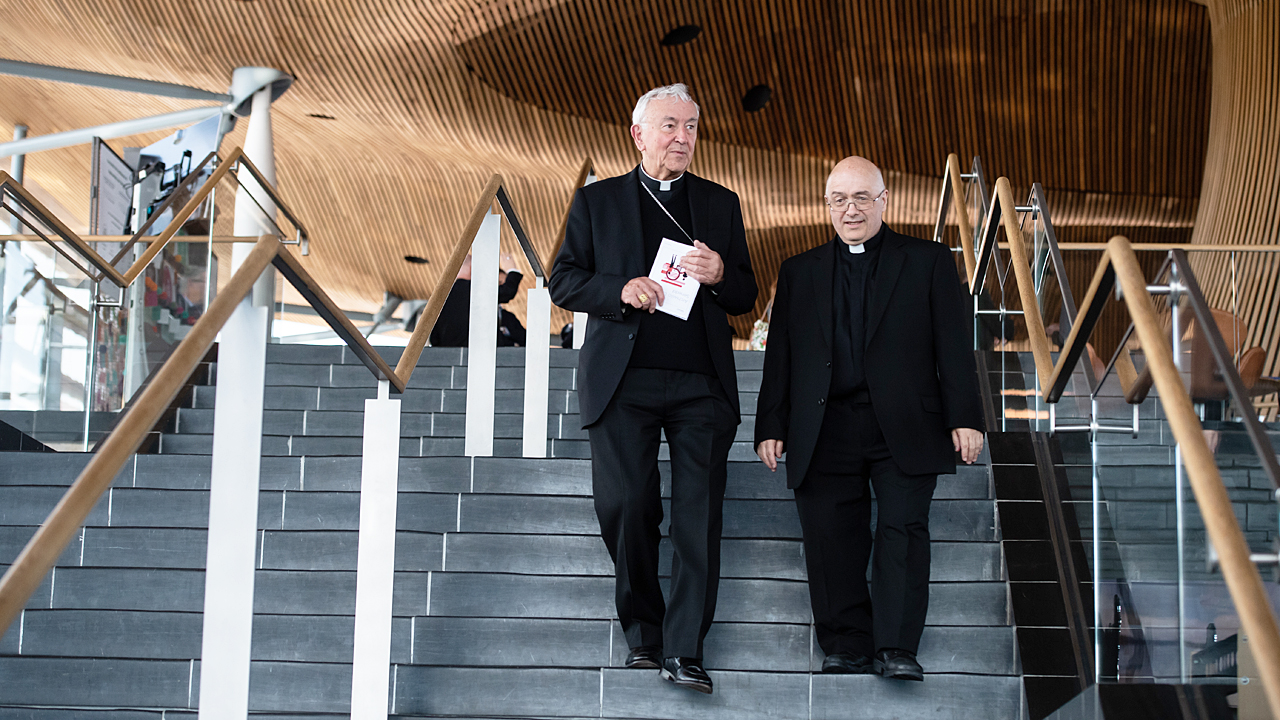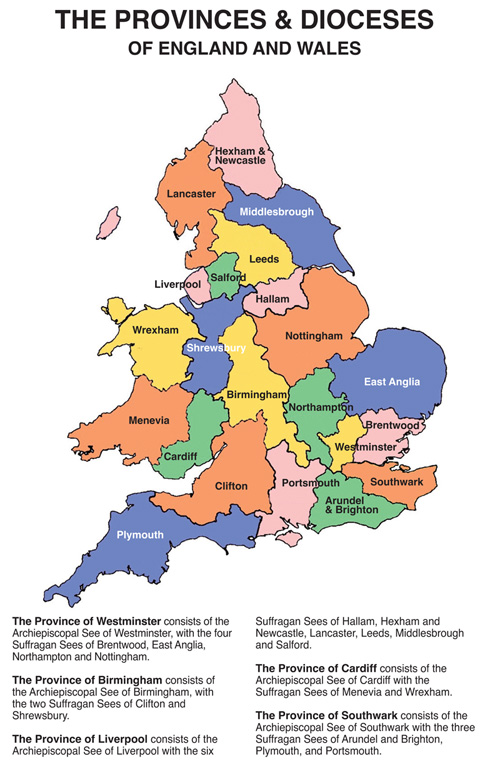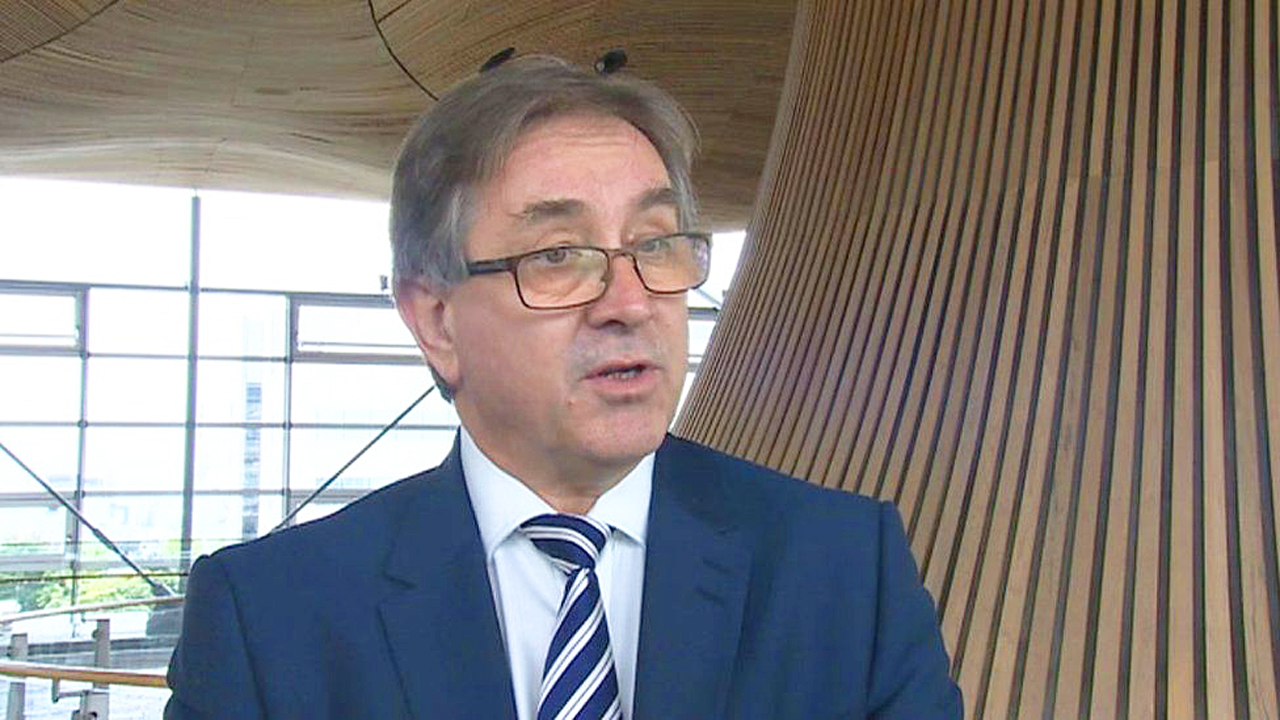As our Catholic bishops pay a visit to Senedd, Welsh government blasts Westminster over its “assault on human rights” and calls for Bill of Rights for Wales, says Joseph Kelly
In Welsh government circles, Wednesdays are fairly important. Plenary meetings, which are attended by all Members of the Senedd, take place on Tuesdays and Wednesdays, with the Wednesday being the usual day for important outcomes to be announced.
This week’s Senedd plenary has been slightly unusual in that the full contingent of the Catholic Bishops of England & wales were on site, visiting the Assembly building as part of their Spring Plenary meeting, the first time they’ve met for a plenary in Wales since November 2004.
That 2004 meeting was just five years after devolution, and few could have anticipated the huge changes that have happened since, much of it in response to relentless convulsions in Westminster.
Until the 13th century Wales was a loose confederation of local overlords but in many respects actually became a united province when King Edward I threw up a string of border castles and sought to subjugate the Welsh with the Statue of Rhuddlan, which made the region subject to English common law. This was both the end of Welsh independence, and the start of it. Although the statute had not been subject to the mutual consent of Parliament, it was an ordinance or decree made personally by the king, and bore the full weight of the law until it was finally repealed in 1887.
The Welsh then had to wait a further 80 years for the Welsh Language Act of 1967 to formally separate Wales from England within the sovereign state of the UK, and it was only in 1997 that a referendum set Wales down the path to devolution, which most agree is just a stepping stone to full independence.
The mechanism of devolution is that initially central government lets insignificant legislative powers devolve as an act of appeasement, but the devolved power works tirelessly to secure further controls and powers, until the essential framework of an independent government becomes a given, and the influence and control of the devolving power becomes meaningless.
In Wales we’re getting pretty close to that point.
In a revealing podcast ahead of the Catholic Bishops’ Spring Plenary in Cardiff, General Secretary Canon Chris Thomas (himself “a proud Welshman” and Welsh speaker) spoke at length about the history of the Catholic faith in Wales, and the contemporary relationship between Westminster and Cardiff.

HE Cardinal Vincent Nichols and Canon Chris Thomas in conversation at the Senedd, Cardiff. © Marcin Mazur/cbcew.org.uk
“To be honest, the way that the Church now deals with the civic authorities in Wales is just as important as we do here in England with Westminster,” said Canon Thomas.
“The devolution process has created a very distinctive character within the Principality. You could say that Welsh-ness has come to the fore.
“The Senedd and the Welsh government now have really important functions,” he said.
“For us in the Catholic Church, there are two which are really important. The first is that educational matters are devolved in Wales, and therefore we have to deal in the Catholic Education Service has a Welsh Officer, Angela Keller, who works in Cardiff, and she deals with Welsh issues surrounding education. One of the great differences between education in Wales and in England is that there are no Academies in Wales. So we still work on the voluntary-aided principle, which is very distinctive from the academisation process that is going on in England.
“And also health matters are devolved in Wales so there’s a difference in policy on health. People who live in Wales are blessed because they don’t have to pay for prescriptions! Obviously health and the well being of people is a very important part of our Catholic teaching so the Catholic Church in Wales has a very important voice to play in those areas particularly,” he said.
This meeting also corresponds with the appointment by Pope Francis of Bishop Mark O’Toole of Plymouth to the unusual dual role of Archbishop of Cardiff and Bishop of Menevia, which keeps both diocese distinct, but unites them in persona Episcopi – under the one person of the bishop. This goes a long way to rationalising the fragmented history of the Catholic hierarchy in Wales.
In the year of of the Restoration of the Hierarchy in England & Wales (1850), Pope Pius IX issued a papal Bull Universalis Ecclesiae which recreated the the Catholic diocesan hierarchy that had been extinguished so ruthlessly under Elizabeth I. This Bull initially divided the Catholic Church in Wales between the Diocese of Shrewsbury in the north and the Diocese of Newport and Menevia in the south.
In July 1895 Newport and Menevia split, with the counties of Glamorgan, Monmouth and Hereford becoming the Diocese of Newport; North Wales was separated from the Diocese of Shrewsbury and joined to the remainder of Wales to become the Apostolic Vicarate of Wales. In 1898 this became the Diocese of Menevia and in 1916 the Diocese of Newport became the Archdiocese of Cardiff. The changes were completed in 1987 when the northern half of the Diocese of Menevia became the Diocese of Wrexham.

In some respects these convoluted changes do reflect the modern demographic of modern Wales. The north is culturally, economically and politically distinct, drawing its reference points from the cross-border cities of Liverpool and Manchester. The south Wales valleys have always enjoyed a unique and powerful history, and the central belt that is much of the Diocese of Menevia remains a heavily rural and largely untouched landscape, though it’s incursion into the south via Swansea has always been something of an anachronism. Since the retirement of Bishop Tom Burns in 2019, the Diocese of Menevia has been administered by Archbishop Stack of Cardiff, so the new dual role for Bishop O’Toole makes obvious sense.
It seems clear from this appointment, and from Canon Thomas’s comments, that our bishops are keen to open a new chapter for the Catholic hierarchy in Wales. Interestingly, when Pope Benedict XVI made his historic visit to the UK back in 2010, the future role of the Catholic hierarchy and the Bishops’ Conference in relation to Wales was the subject of some discussion.
For various reasons His Holiness was unable to visit Wales, so arrangements were made to incorporate various Welsh elements to the Mass he celebrated at Westminster Cathedral. I had the great privilege to work on behalf of the Bishops’ Conference with the National Library of Wales to commission and produce a gift to Benedict from the people of Wales – an exact facsimile of a 16th century book by Blessed William Davis, Y Drych Christianogawl – The Christian Mirror, said to have been the first book ever printed in Wales. The fantastic mosaic mural of St David in Westminster Cathedral also comes from that day.
Coming just three years after devolution, the visit and the ‘Welsh moment’ renewed debate over the role of the Catholic Church in Wales, and how this relationship might develop under a devolved administration. At the time there was even some suggestion that the Catholic Bishops Conference of England & Wales might experience a devolution of its own!
Returning to the present, Canon Thomas is quite right to point out that times have changed, as UK political power shifts generally from a centralised Westminster administration to a more generally devolved local context, as today’s local elections will no doubt underscore.
Back at the Plenary in Cardiff our bishops have been be laying out their political, social and moral priorities in Wales and beyond.
“We’ll be looking at things that are of concern,” said Canon Thomas.
“We’re going to be looking at domestic poverty and the issues that are arising because of cost of living issues. Nobody can escape that fact that the cost of living is going up, and we can’t divorce ourselves from these social issues.
“We demonstrated very tangibly during the pandemic how our Catholic communities support people in real need through alleviating poverty, through food banks, through other practical, real front-line resources. Can we do this more strategically, as well as petitioning government to have better policies in place for the alleviation of poverty?,” he said.
“We’ll also be looking at the issues that have come forth from the publication of the government’s Rwanda policy and refugee issues. How do we receive, how do we welcome, how do we integrate people who are seeking safety? That’s always been part of our tradition in this country. We have always been a place where we live according to the freedom of law. And we welcome people who are escaping injustices in their own countries.”
No doubt they’ll have also made it clear to Senedd members that the UK Government’s Nationality and Borders Bill – which was passed last week despite huge concerns from all quarters – is a stark indicator that this present Westminster administration has little understanding of, or empathy for, basic human rights.
Just hours after meeting with the bishops, the Senedd Plenary condemned the UK government for its “assault on human rights.”
Supported by Plaid Cymru and the Welsh Liberal Democrats, Wales Ministers blasted the UK Government on three key pieces of their legislation which they branded as “callous, unconstitutional and in complete opposition to Welsh values and the founding principles of the Senedd.”
In particular Senedd Counsel General Mick Antoniw said that people should be under no illusion that the UK Governments actions: “clearly demonstrate a calculated effort to undermine all of our basic human rights”.

Mr Antoniw (above) said that given the shadow of the war in Ukraine, the Welsh government should be standing four square with its nearest neighbour, but this simply isn’t possible.
He said that Westminster’s proposals: “give only the signal to the world that the UK is backtracking on human rights. Their efforts seek to erode not strengthen.
“If these proposals are carried into law, they would weaken the rights of all UK citizens, it would reduce access to justice and target the most vulnerable people in our society, including disabled people and those in poverty.”
In words that will resonate deeply with Catholic concerns, Mr Antoniw said that: “the proposals also seek to distinguish between “deserving” and “undeserving” people or cases, which strikes at the heart of the principle that human rights should apply equally to everyone.”
His comments were echoed by the Wales Minister for Social Justice, Jane Hutt, who said that recent government Bills relating to human rights are: “entirely incompatible with the values we hold dear in Wales.”
Just last week the United Nations blasted the Nationality and Borders Act, saying the Act would seriously undermine the protection of trafficked persons, including children, and warned it would allow women who have experienced gender based violence to be turned away rather than seek sanctuary.
UN Special Rapporteur on Trafficking in Persons Siobhán Mullally said this was ‘…in violation of international law’.
One of the proposals discussed at yesterday’s meeting of the Senedd is to incorporate UN Conventions into Welsh law, which in turn could lead to the creation of a Welsh Bill of Rights.
The Senedd warned that :”If the UK Government continue down this destructive and harmful path, the Welsh Government would like to consider the potential scope of what could be achieved through a Bill in Wales.
The purpose of such a Bill would be to strengthen human rights and mitigate as far as possible the negative impacts of actions by the UK Government.”
Given this general direction of travel in Wales, and the contrary indications from Westminster, it’s understandable that our bishops are seeking to build meaningful bridges with the administration in Cardiff. From healthcare, transport and social services provision, to its position on human rights and the treatment of refuges, Wales has been a commendable outlier in its humanity, and its commitment to the preservation of human dignity and rights.
In his podcast Canon Thomas made it clear that this week’s meeting in Cardiff: “is not only important in the fact that we are a Bishops’ Conference of England and Wales, but it’s important to make a strong statement about Catholic life in the Principality – in Wales itself.
“The physical presence of our bishops being together will be integral to it … to basically show that we are real partners in developing not only the Catholic voice in Wales, but also in building up the whole of the society.”
Joseph Kelly is a Catholic writer and publisher, and is founder of www.thecatholicnetwork.co.uk
Main pic: © Marcin Mazur/cbcew.org.uk
Canon Chris Thomas’ Podcast:

Would it not make greater sense for Wales to have its own Bishops’ Conference distinct from England as Scotland already has?